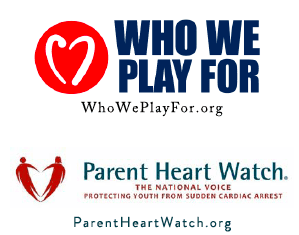
What is Sudden Cardiac Arrest?
 Sudden Cardiac Arrest (SCA) is a life-threatening emergency that occurs when the heart suddenly stops beating. It strikes people of all ages who may seem to be healthy, even children and teens.
Sudden Cardiac Arrest (SCA) is a life-threatening emergency that occurs when the heart suddenly stops beating. It strikes people of all ages who may seem to be healthy, even children and teens.
When SCA happens, the person collapses and doesn’t respond or breathe normally. They may gasp or shake as if having a seizure.
SCA leads to death in minutes if the person does not get help right away. Survival depends on people nearby calling 911, starting CPR I, and using an AED2 as soon as possible.
1 CPR: Cardiopulmonary resuscitation is when you push hard and fast on the center of chest to make the heart pump; compressions may be given with or without rescue breaths
2 AED: Automated external defibrillator is a device that analyzes the heart and if it detects a problem may deliver a shock to restart the heart’s normal rhythm.
Why do heart conditions that put youth at risk go undetected?
- Standard history and physical evaluation misses up to 90% of youth at risk
- An EKG can detect 2/3 of heart conditions that can lead to SCA
- Often youth don’t report or recognize symptoms of a potential heart condition
- Parents/Cuardians assume youth are okay and just “check the box” on medical forms without asking their child about symptoms
- Youth experiencing symptoms regularly don’t recognize these as potentially life-threatening—it’s normal to them
What is an electrocardiogram?
An electrocardiogram (also known as an EKG or ECG) is a quick, painless and noninvasive test that measures and records a moment in time of the heart’s electrical activity through small electrode patches attached to the skin of your chest, arms and legs by a technician.
Why add an EKG to the pre-participation physical evaluation?
Adding an EKC to the pre-participation physical evaluation (PPE) will identify most heart conditions that can lead to SCA and prevent disabilities and sudden death in youth.
- An EKC can be ordered by your physician for screening for heart disease or for a variety of symptoms or a family history of heart disease and will generally be paid for by insurance, ICD IO-CM Code Z03.89.
- EKGs should be read by a medical practitioner proficient in the age group being screened, utilizing current International Criteria for ECC Interpretation in Athletes.
- Like any screening test, if the EKG is abnormal, additional testing and consultation should be done before a diagnosis is made.
- One screening using EKG does not clear the student-athlete for life.
- EKGs should be performed at regular intervals combined with cardiac risk assessment for new symptoms or relevant family history.

How common is Sudden Cardiac Arrest?
- SCA affects more than 356,000 people each year in the U.S., including over 7,000 youth under age 18. SCA is the #1 killer of student athletes and the leading cause of death on school campuses.
- One in 300 youth has an undetected heart condition that puts them at risk.
What are the warning signs and symptoms?
- Fainting or seizure, especially during or right after exercise Fainting repeatedly or with excitement or startle Chest pain or discomfort with exercise
- Racing heart, palpitations or irregular heartbeat
- Dizziness or lightheadedness Excessive, unexpected fatigue during or after exercise
- Excessive shortness of breath during exercise
Why does family history matter?
It is important to gather your family history (parents, siblings, grandparents, aunts, uncles, cousins) and share it with your medical provider as some conditions are inherited: any family member with heart disease; even if the condition was treated and remedied unexplained fainting or seizures unexplained sudden death of a family member under the age of 50
What are the risks of practicing or playing after experiencing any warning sign or symptom?
By continuing to practice or play without seeking medical attention you risk suffering sudden cardiac arrest, which without immediate action by people nearby could result in death or brain damage. Survival rates are under 10%.
What if student-athlete is diagnosed with a heart condition that puts him/her at risk for SCA?
- Your medical provider will inform you of the recommended treatment plan, which could include taking medication, making lifestyle modifications to reduce risk (which sometimes means refraining from competitive sports), surgery to correct the issue, or implantable devices that monitor or treat your heart rhythm.
- You will need clearance in writing from a licensed medical practitioner according to the Florida High School Athletic Association bylaws or state laws.
- It’s important to share the student-athlete’s treatment plan with school administration, athletic trainers, coaches or any other leaders. As youth caregivers, they must be aware so they can help monitor your child’s condition.
What are some of the causes of Sudden Cardiac Arrest?
- Congenital (runs in families) disease
- Acquired disease (Kawasaki and others)
- Viral heart infection (myocarditis)
- Heart conditions that result from abnormal heart structure or functions
- An abnormality in the electrical system of the heart An impact to the chest directly over the heart, also known as commotio cordis
- Drugs (recreational or prescribed) or stimulants that affect the electrical system of the heart, such as performance enhancing or high-caffeine energy drinks or supplements and diet pills


